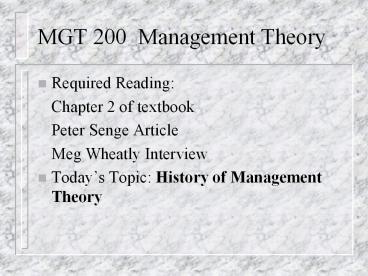MGT 200 Management Theory PowerPoint PPT Presentation
Title: MGT 200 Management Theory
1
MGT 200 Management Theory
- Required Reading
- Chapter 2 of textbook
- Peter Senge Article
- Meg Wheatly Interview
- Todays Topic History of Management Theory
2
Learning Objectives
- Know the basic premises of six management
theories - Understand the context for the evolution and
development of these theories - Know the basic concepts of several current trends
in management - Explore three forces that are changing the
context for managerial work today
3
Management Theories/Concepts
- Division of Labor
- Scientific Management
- Administrative Theories
- Behavioral Theory
- Chaos Theory
- Contingency Theory
4
Division of Labor
- Adam Smith The Wealth of Nations
- Premise Increase productivity by breaking down
jobs into narrow, repetitive tasks
5
Scientific Management
- Management practices should be based on fact and
observation - Focuses on the relationship between individual
workers and their tools or machines
6
Scientific Management
- Frederick Taylor
- There is one best way to perform a task
- Time and motion studies
- Money motivates employees to do their best
- Frank and Lillian Gilbreth
- Followers of Taylor
- Henry Gantt
- Control systems for production scheduling
7
Assessing Scientific Management
- Many aspects used today
- Misreads human side of work
- Simple tasks and clear rules dont guarantee
results
8
Administrative Theories
- Focus on managers and their behavior
- Henri Fayol, French industrialist
- Management is a discipline with principles that
can be taught - Max Weber
- Developed the concept of bureaucracy as the
ideal structure for an organization
9
Fayols Administrative Principles
- 1. Division of labor
- 2. Authority to give orders
- 3. Discipline
- 4. Unity of command
- 5. Unity of direction
- 6. Subordination of individual interest
- 7. Remuneration pay for work done
- 8. Centralization
- 9. Scalar chain
- 10. Order
- 11. Equity
- 12. Stability and tenure of staff
- 13. Initiative
- 14. Esprit de corps
10
Bureaucratic Management
- Formal system of rules and procedures
- Impersonality
- Hierarchical structure with detailed authority
- Clear division of labor
- Rationality
- Career commitment
11
Assessing Administrative Theories
- Managers still use many of Fayols principles
- Overemphasizes the rational behavior of managers
- Advantages disadvantages of bureaucracy
- Benefits efficiency, consistency
- Costs rigid, slow, difficult to adapt
12
Behavioral Theory
- Focuses on the human aspects of organizations
- Mary Parker Follet
- Management is a dynamic process
- Workers should be involved in decisions
- Chester Barnard
- Organizations are social systems
- Managers need buy-in of employees
13
Hawthorne Studies
- A scientific theory study that provided strong
support for the behavioral viewpoint - The Hawthorne Effect Productivity is likely to
increase when employees are given special
attention regardless of whether working
conditions change - The social environment of employees also greatly
influences productivity
14
Behavioral Theory
- Basic Assumptions
- Employees are motivated by social needs
- Social forces exerted by peers is strong
- Employees respond to managers who help them
satisfy their needs - Managers need to coordinate the work of
subordinates democratically to improve efficiency
15
Behavioral Theory Assessment
- Adds greatly to the mechanistic view of managing
people - But human relation skills alone wont guarantee
increased productivity or high quality work - Managing the human aspects of an organization is
a very complex task
16
Chaos Theory
- Margaret Wheatley, 1992
- Look at an organization as a living organism
- Learn management from natural systems
- Basic Premise Self-organization
- the tendency of living systems to organize into
structure without any externally imposed plan
17
Chaos Theory Principles
- Information access
- Everyone has easy access to all the information
they need to do their job - Relationships
- Everyone has easy access to anyone they need to
do their job - Self-reference
- The organizations core identity or purpose
18
Chaos Theory Assessment
- Goes against many traditional beliefs about role
of managers - Requires educated, involved employees
- Requires change in communication methods
- Clear vision/joint purpose is crucial
19
Contingency Viewpoint
- There is no best way to manage in all situations
- Use the different management viewpoints as
appropriate to deal with various situations - Managers must be able to diagnose and understand
a situation thoroughly
20
Contingency Viewpoint
- Basic contingency variables
- External environment
- Technology
- Individuals
- Importance of each variable depends on type of
situation and problems being faced
21
Assessing the Contingency Viewpoint
- Useful approach - makes sense to change
viewpoint depending on situation - Most managers use intuitively
- Diagnosis very important to determine best
approach - Many dont consider to really be a theory of
management - just draws on other theories
22
Management Theories Summary
- Division of Labor - Adam Smith
- Scientific Management - Taylor, Gilbreths, Gantt
- Administrative Theories - Fayol, Weber
- Organizational Behavior - Follett, Barnard
- Chaos Theory - Wheatley
- Contingency Theory
23
Whats Next?
- Current Trends and Issues in Management
- Read Chapter 2 pages 40-53
- Read Senge handout on Systems Thinking

